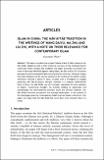Files in this item
Islam in China : the Hān Kitāb tradition in the writings of Wang Daiyu, Ma Zhu and Liu Zhi, with a note on their relevance for contemporary Islam
Item metadata
| dc.contributor.author | Wain, Alexander | |
| dc.date.accessioned | 2021-09-15T09:30:10Z | |
| dc.date.available | 2021-09-15T09:30:10Z | |
| dc.date.issued | 2016-01-15 | |
| dc.identifier | 275491437 | |
| dc.identifier | add7620c-b6b4-4a2d-a853-ef21293d23ac | |
| dc.identifier.citation | Wain , A 2016 , ' Islam in China : the Hān Kitāb tradition in the writings of Wang Daiyu, Ma Zhu and Liu Zhi, with a note on their relevance for contemporary Islam ' , Islam and Civilisational Renewal , vol. 7 , no. 1 , pp. 27-46 . https://doi.org/10.52282/icr.v7i1.282 | en |
| dc.identifier.issn | 2041-8728 | |
| dc.identifier.uri | https://hdl.handle.net/10023/23961 | |
| dc.description.abstract | This paper examines the unique Chinese brand of Islam known as the Han Kitab. Beginning with a brief historical overview of the Sinicised Muslim community which created this tradition, the paper proceeds to examine the work of three key Han Kitab figures: Wang Daiyu, Ma Zhu and Liu Zhi. All active between the mid-seventeenth and early eighteenth centuries, the paper argues that their utilisation of the Islamic concept of din al-fitra (or humanity’s innate inclination towards a belief in God), coupled with a willingness to engage positively with Neo-Confucian thought, resulted in a uniquely multicultural form of Islam; the Han Kitab, we will conclude, represents an early example of Islamic ‘ecumenical thought’. By actively seeking to appreciate and acknowledge the commonalities between Islam and Chinese tradition, the Han Kitab overcame exclusivism and stressed moderation. In the context of the challenges posed by contemporary Salafi-inspired Islamic extremism, this paper will argue that the Han Kitab has never been more relevant than it is today. | |
| dc.format.extent | 19 | |
| dc.format.extent | 1126850 | |
| dc.language.iso | eng | |
| dc.relation.ispartof | Islam and Civilisational Renewal | en |
| dc.subject | BP Islam. Bahaism. Theosophy, etc | en |
| dc.subject | SDG 16 - Peace, Justice and Strong Institutions | en |
| dc.subject.lcc | BP | en |
| dc.title | Islam in China : the Hān Kitāb tradition in the writings of Wang Daiyu, Ma Zhu and Liu Zhi, with a note on their relevance for contemporary Islam | en |
| dc.type | Journal article | en |
| dc.contributor.institution | University of St Andrews. School of Divinity | en |
| dc.identifier.doi | 10.52282/icr.v7i1.282 | |
| dc.description.status | Peer reviewed | en |
This item appears in the following Collection(s)
Items in the St Andrews Research Repository are protected by copyright, with all rights reserved, unless otherwise indicated.

